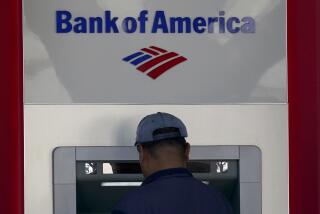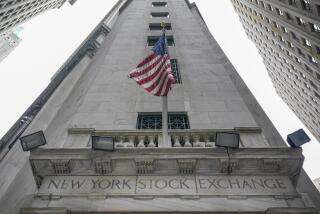Bank Shares Pummeled as Corporate Losses Mount
- Share via
Bank stocks tumbled Friday under a cascade of bad news: A big airlines lender said it was boosting provisions for losses by $1 billion because of the Sept. 11 terrorist attacks, and federal regulators reported a near-doubling of troubled loans to large corporate borrowers.
The regulators’ survey, taken in May and June but released Friday, found that the weak economy was compounding losses on high-risk loans made during the 1990s.
Most banks already have beefed up reserves for losses on loans to manufacturers, technology firms, utilities and airlines, regulators said. Whether those reserves will be enough remains an open question.
Although the banking industry overall was in strong financial shape going into the economic slowdown, the terrorist attacks have sent bankers back to reassess many loans.
A projection Friday from U.S. Bancorp (ticker symbol: USB), the eighth-largest U.S. bank, was grim: The bank expects a combined $1 billion in loan charge-offs and added reserves to cut third-quarter earnings by $655 million after taxes.
“After Sept. 11, we asked our people to reevaluate all sectors we have exposure to,” including $700 million in loans and leases to airlines, said David M. Moffett, chief financial officer of the Minneapolis bank. “We have to be well-reserved in order to deal with” economic fallout, he said.
Moffett said U.S. Bancorp’s decision to boost reserves was based on projections of an economic recession in the third and fourth quarter of this year and the first quarter of 2002, with a slight pickup in spring of next year and more robust growth in the second half.
Investors pummeled U.S. Bancorp’s shares Friday. They fell $3.51, or 16%, to $18.44 on the New York Stock Exchange.
Standard & Poor’s index of 23 major banks fell 5.1%. Losers included Wachovia Corp. (WB), off $2.17 to $28.65, a drop of 7%; Bank of America (BAC), down 4.7%, or $2.76, to $56.13; and Wells Fargo & Co. (WFC), off 2.7%, or $1.20, to $43.05. All trade on the NYSE.
U.S. Bancorp’s warning came one day after Goldman, Sachs & Co. analyst Lori Appelbaum downgraded stocks of four smaller regional banks, in part because they’ve been slower than major banks to deal with bad loans. One of the four was City National Corp. (CYN) in Beverly Hills, whose stock dropped 5.6% on Thursday. The shares fell 4.5%, or $1.80, on Friday to close at $38.33 on the NYSE.
The regulatory survey by the Federal Reserve, the Office of the Comptroller of the Currency and the Federal Deposit Insurance Corp. looked at so-called syndicated loans. These loans of more than $20 million to corporate customers are made by groups of three or more banks, which team up to limit their risks on any given loan.
Syndicated loans at risk of default totaled $193 billion, or 9.4% of total syndicated loans, in the spring. That compared with $99.5 billion, or 5.2% of all loans, a year earlier.
David Gibbons, deputy comptroller for credit risk, said the upward trend in problem loans would have continued “even if the economy had turned on a dime June 30 and rocketed up.” Because problem loans lag behind the general economy, it will probably be six to nine months after economic growth resumes before problem loans start to decline, he said.
More to Read
Inside the business of entertainment
The Wide Shot brings you news, analysis and insights on everything from streaming wars to production — and what it all means for the future.
You may occasionally receive promotional content from the Los Angeles Times.











